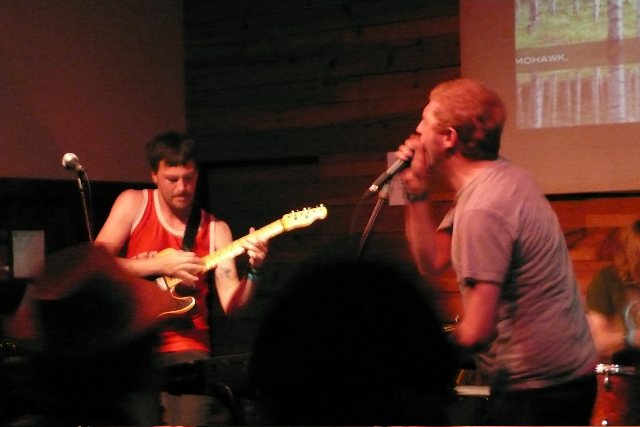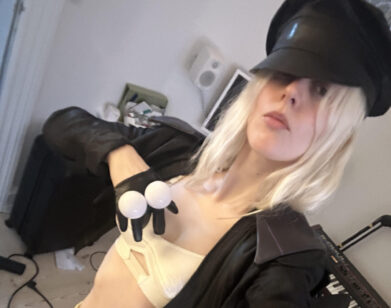SXSW Day III: Your Logo T Says It All
Entering the second half of SXSW, you have to give into the frantic pushing and pulling of the crowds: It’s time to stop worrying and learn to love the mob. I passed a bouncer wearing a black T-shirt that read “SXSW: Embrace the Madness.” He probably meant it ironically, but in a packed club with drums blaring it made sense. Perhaps the only tactic to beating the unwashed masses is to head to an 8 PM show. At most clubs that’s the first act of the night, usually a lesser-known act: Being there with the few true believers, that’s the definitive way to get to know a young band.
That’s when I saw French Miami, a San Francisco trio. They played at Mohawk’s—one of the most the intimate clubs here—and they wasted no time getting into a hard-charging set based on muscular guitar riffs and propulsive drumming. At times, the vocals veered toward detachment of Joy Division, but they were beside the point: The rhythm was the thing, and with songs like “We Get Along,” French Miami impressed with its single-minded urgency.
School of Seven Bells—another trio, this one from Brooklyn-play an engaging mixture of synth-driven pop and swirling guitars. Their excellent album from last year, Alpinisms, recalls the dreamy harmonies of the Cocteau Twins and the echoing guitars of Slowdive. The Deheza sisters, the vocalists, took a while to assert themselves, but once they did their voices matched the intensity of the music and you knew you were in the presence of genuine pop promise.
Emo’s Jr. is a popular venue that isn’t much more than a brick room with a bar. That’s where The Pains of Being Pure at Heart played straight ahead rock songs from their self-titled debut album. With songs like “Young Adult Friction,” the band sounds like relations of Teenage Fanclub. The New York band wasn’t looking to reinvent any genre; they put their belief in well crafted, fast-paced tracks. There’s nothing wrong with that: It worked for The Ramones.
For an urbane view of the proceedings in Austin there’s no better voice to turn to than that of Englishman John Wesley Harding. The songwriter’s website describes his music as ‘folk noir’ and his literate songs are more socially observant than they have any right to be. They’re full of cautionary narratives-you want to hear how they turn out. His lyrics make sly references to VIP lists, Perrier, and his own unpredictable career (he’s a successful writer, who recently published the novel By George under his given name, Wesley Stace).
He brought along members of his touring Cabinet of Curiosities, which included a very funny comic Toddy Barry who described his concern for skater boys who wear snow caps regardless of the heat. Harding had a winning rapport with the Eugene Merman-they read poems to each other, and appreciated the surrounding chaos. Harding played songs from his latest album, Who Was Changed and Who Was Dead, and though he remained above the fray, he may have spoken for many bands here when he sang ‘those dreams don’t come cheap.’
After the last shows at 2 AM, people pour out of clubs, and Sixth Street is a truly manic scene. Drunk fraternity brothers stumble past tender Brooklyn-based souls in tight jeans. There are an incredible number of tattoos and girls in sundresses who are anything but modest. There are lines to buy pizza, no taxis anywhere, and exhausted bands loading vans with gear. So it’s a pleasure to return to the Saint Cecilia, a new hotel off South Congress run by Liz Lambert, Austin’s resident genius behind the local standbys San Jose Hotel and Jo’s Coffee.
The Saint Cecilia has a rolling lawn (it’s rare to see anything so green here), a lap pool, a friendly laidback staff, and legitimate music credibility—you never know who you’ll run into in the courtyard. Lambert’s even parked a vintage Citroen in the driveway. Saint Cecilia is the patron saint of music-and there’s a vinyl library and record players in all the rooms. The St. Cecilia is begging you please to come home.







